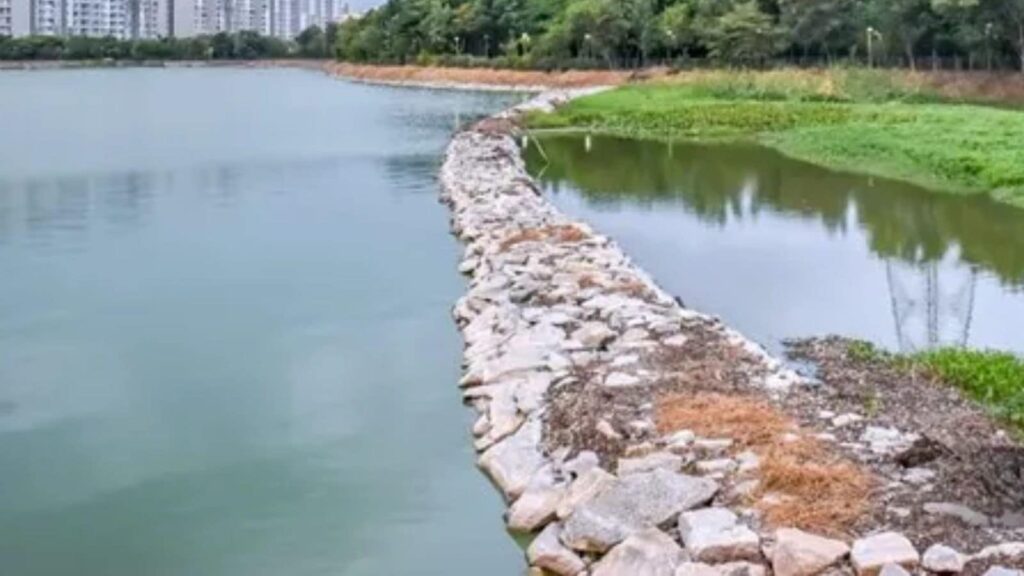The National Green Tribunal (NGT) has stepped in to scrutinise the Karnataka Government’s recent move to reduce the buffer zones around lakes and tanks, taking suo motu cognisance of a media report dated July 28 highlighting the Cabinet’s approval of revised norms for lake conservation.
In notices issued on August 8, a bench of Justices Prakash Srivastava and A Senthil Vel sought responses from the environment department and made the Karnataka Lake Conservation and Development Authority, the Karnataka State Pollution Control Board, the Bangalore Development Authority, and the Central Pollution Control Board parties to the case.
The matter, transferred to the Southern Zonal Bench, will be heard next on September 26.
The tribunal’s intervention comes against the backdrop of the passage of the Karnataka Tank Conservation and Development Authority (Amendment) Bill 2025, which seeks to amend the Karnataka Tank Conservation and Development Authority Act 2014.
The Bill, which was passed in the Assembly and the Legislative Council recently, introduces area-wise buffer zones for tanks and lakes, effectively moving away from the earlier uniform restrictions. According to the new table of norms, the buffer zone will now vary with the size of the waterbody—ranging from 0 m for very small tanks (up to 0.05 acre) to 30 m for large lakes of more than 100 acres. Mid-sized tanks will have proportional buffer limits, such as 3 m for tanks between 0.05 and 1 acre, 6 m for those between 1 and 10 acres, 12 m for tanks of 10–25 acres, and 24 m for those between 25 and 100 acres.
This area-based categorisation marks a significant departure from the broader protective zones recommended in earlier guidelines, which many conservationists had argued were essential for maintaining the ecological health of lakes and their catchments.
Alongside buffer reclassification, the Bill introduces provisions to permit certain public utility works within tank areas and their buffer zones. These include roads, bridges, water supply lines, sewage treatment plants, underground drainage systems, pump houses, electrical infrastructure, and allied works. Such permissions will be conditional on ensuring that the tank’s original capacity is not reduced and that there is no obstruction to the natural inflow or outflow of water.
Story continues below this ad
Further, the Bill allows industrial, recreational, and commercial activities within these zones, again with prior approval from the authority. However, it clarifies that these permissions are subject to compliance with existing siting guidelines and pollution control norms under the Water (Prevention and Control of Pollution) Rules 1976. Healthcare establishments and new infrastructure projects, however, are excluded from these relaxations.
The Government has justified the amendments by citing the recommendations of a technical committee headed by the chief secretary. The committee had argued for more practical, size-based norms, contending that a blanket buffer requirement was neither feasible in urban areas nor necessary for small waterbodies. The Bill’s statement of objects and reasons notes that the aim is to facilitate development while still ensuring water conservation.
Residents petition Governor Thaawarchand Gehlot
Meanwhile, a residents’ delegation under the banner of Bengaluru Town Hall met Governor Thaawarchand Gehlot on Monday and submitted a memorandum opposing the Bill. The group urged him to return the Bill for reconsideration, arguing that it weakens lake protection norms and violates constitutional and environmental safeguards.
The memorandum highlighted that the Bill reduces lake buffer zones to a maximum of 30 m—far below what experts recommend. Hydrology and environment specialists, at a public consultation held by Bengaluru Town Hall on August 9, advocated 100–300 m buffer zones to safeguard ecosystem integrity, biodiversity, flood control, and water quality. They warned that the amendment would pave the way for reckless real estate development, endanger water security, and undermine the ecological balance of urban and rural lakes. The delegation alleged that the Bill was passed without adequate public or expert consultation, amounting to a violation of constitutional provisions related to environmental protection.
The delegation to the governor included actor-director Prakash Belawadi, Anirudhan Sandeep (convenor, Citizens’ Agenda for Bengaluru), Kathyayini Chamaraj (executive trustee, Civic Bangalore), Dattatraya Devare (trustee, Bangalore Environment Trust), and Rajkumar Dugar (Citizens for Citizens).

